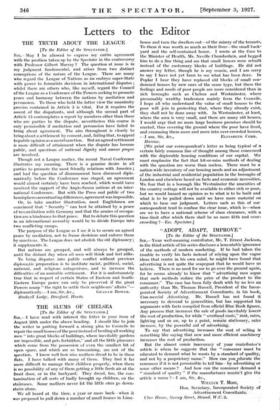THE SLUMS OF CHELSEA [To the Editor of the SPECTATOR.]
have read with interest • the letter in your issue of August 20th under the above heading. I should like to join the writer in putting forward a strong plea to Councils to repair the small houses of the poor instead of herding all working men " into great blocks of buildings, where inevitably gardens are impossible, and pets forbidden," and all the little pleasures which come from the possession of even the smallest bit of open space, and which are so humanizing, are out of the question. I know well how nice mothers dread to be in these fiats. I have talked with many of them. They find it far more difficult to manage their children properly, when there is no possibility of any of them getting a little fresh air at the front door, or in the backyard. They dread, too, the con- tamination of all sorts of badly brought up children, on the staircases. Some mothers never let the little ones go down- stairs alone.
We all heard at the time, a year or more back--when it was proposed to pull down a number of small houses in Lime-
house and turn the dwellers out—of the misery of the tenants. To them it was worth as much as their lives—the small back- yard and the self-contained house. I wrote at the time to the Minister of Health, Mr. Neville Chamberlain, and begged him to do a fine thing and see that small houses were rebuilt instead of the customary- blocks of buildings. He did not answer my letter, though he is my cousin, and I. am sorry
to say I have not yet been to see what has been done. In Poplar I hear they have replaced old blocks of small con-
demned houses by new ones of the same type, but there the feelings and needs of poor people are more considered than in rich boroughs such as Chelsea and Westminster, where presumably wealthy tradesmen mainly form the Councils.
I hope all who understand the value of small houses to the poor will join in protesting that, where they already exist, they shall not be done away with. In Westminster, at least, where the area is very small, and there are many old houses, I would urge that no more large business premises should be erected, thus covering the ground where the poor have lived, and cramming them more and more into over-crowded houses.
[We print our correspondent's letter as being typical of a certain fairly common line of thought among those concerned
with the deplorable housing conditions of our capital. We must emphasize the fact that hit-or-miss methods of dealing with the question are worse than useless. There must be a nation-wide inventory of our housing needs and an adjustment of the industrial and residential population in the boroughs of London and elsewhere based on facts and economic necessities.
We fear that in a borough like Westminster the amenities of the country cottage will not be available to either rich or poor, but we would hazard no opinion as to what is to be built and what is to be pulled down until we have more material on which to base our judgment. Letters such as this of our correspondent tend to confuse the clear issue, which is—when are we to have a national scheme of slum clearance, with a time-limit after which there shall be no more filth and over- crowding ?—En. Spectator.]










































 Previous page
Previous page